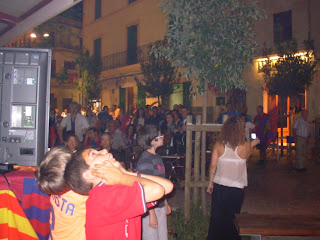“How now, young fellow, what dost thou here?”
“Truly, sir, I take mine ease.”
“Is not this the hour of the class? And should'st thou not be plying thy Book with diligence, to the end thou mayest obtain knowledge?”
“Nay, but this also I follow after Learning, by your leave.”
“Learning, quotha! After what fashion, I pray thee? Is it mathematics?”
“No, to be sure.”
“Is it metaphysics?”
“Nor that.”
“Is it some language?”
“Nay, it is no language.”
“Is it a trade?”
“Nor a trade neither.”
“Why, then, what is't?”
“Indeed, sir, as a time may soon come for me to go upon Pilgrimage, I am desirous to note what is commonly done by persons in my case, and where are the ugliest Sloughs and Thickets on the Road; as also, what manner of Staff is of the best service. Moreover, I lie here, by this water, to learn by root-of-heart a lesson which my master teaches me to call Peace, or Contentment.”
—From Robert Louis Stevenson’s “An Apology for Idlers”: a conversation between “Mr. Worldy Wiseman” and “a young lad.”
This year in Spain has been a year of slow reflection. Sometimes, it’s been too slow—with copious free time imposed on me by the Spanish government (I am paid to do 12 hours of work a week and no more; my visa prohibits me from finding outside employment), I feel like a lazy bum. After all, I was weaned on the maxims, “Busy hands, happy hearts” and “Idle Brains are the Devil’s Workhouses” (ok, not that last one—but it did give me a chortle when I randomly googled American proverbs).
One of my fellow Linfield-grads-gone-to-Spain (there are 5 of us in the country this year) described this year as her “personal sabbatical,” and on days when I’m not feeling like a freeloader of society, I agree with her. I have had ample time for reflection, for growth, for reading, for pondering, and, best of all, for sweetly doing nothing.
Just a hop, skip, and a sailboat ride across the Mediterranean away, Spain’s Italian cousins are apparently fond of exclaiming, “Dolce far niente!” which means, literally, “Sweet to do nothing!” or “the sweetness of being idle.”
This “far niente” attitude is a difficult philosophy to adhere to for grindstone-accustomed noses, but after the initial adjustment, I have found Spain’s similar “mañana” attitude quite, well, refreshing. The Spanish Ministry of Treasury hasn’t doled out this quarter’s budget into the Ministry of Education’s coffers, so the Ministry of Education hasn’t deposited any money into any schools' bank accounts, so my particular school can’t give me my paycheck? Don’t worry; the deposit will come tomorrow. Relax. Tomorrow, tomorrow. My boss has repeatedly said, “If you don’t want to come to work today, you can just come tomorrow,” and she’s not joking—she likes me to come to work and help out in the English classes, but she certainly isn’t married to her job, and doesn’t think that I should be, either. We can always go to work tomorrow.
While such forced relaxation grates slightly on my nerves, I have learned to lighten up and let go. We all can do the same; just think how sweet the English language is when it comes to verbs for doing something slowly or unseriously or for not doing anything at all:
amble, bum around, crawl, creep, dabble, dally, dawdle, diddle-daddle, dilly-dally, drag, drift, footle, fiddle, fritter, goof off, hang around, horse around, idle, inch, laze, linger, loaf, loiter, loll, lollygag, lounge, lurk, malinger, mess about, mill about, monkey around, mosey, muck around, piddle, poke, potter, putter, ramble, rest, saunter, shamble, shuffle, stagnate, straggle, tarry, tinker, toddle, trifle, twiddle, vegetate.
Many of those words have a negative cast, to be sure, but many also are evocative of summer—lollygagging around the Mammoth hotel’s ice cream stand, puttering around Joffee Lake in a canoe, frittering away countless hours trying to lie in the sun on a patch of grass not covered by elk or elk turds (those were my summers, at least, before I got a job). (slightly off-subject, but another reason I feel like a malingering loafer right now: my parents moved out of our house in Yellowstone on Monday, and I wasn’t there to help them pack, clean, or move… um, big hug, Mom, Dad, and lil’ bro!)
While this entire year hasn’t been one glorious, long summer (for some reason I thought it would be when I wrote my
first blog post, deciding to title this blog SUMMER on my andirons), I have had enough me-time to think about what I really want to do, how I want to find a career that is simultaneously satisfying and worthwhile. Like Robert Louis Stevenson’s “young lad,” I am desirous to note where the sloughs and thickets in my future are, and to learn peace and contentment. This year, I've stored up enough inner peace and contentment to last me through many stormy years.
And the 12 hours a week I spend doing my actual job are a joy: I like teaching because the kids are a hoot, because it’s fun to play silly games in the name of learning, because I can never get enough of watching their faces when they finally “get it,” and because I’m not wasting my life shuffling around the corporate world—I feel like I’m having a positive impact on these kids’ lives.
Besides, spending sweet hours lazing under the Mediterranean sun has given me time to work on other important things, like my Chaco tan:











































